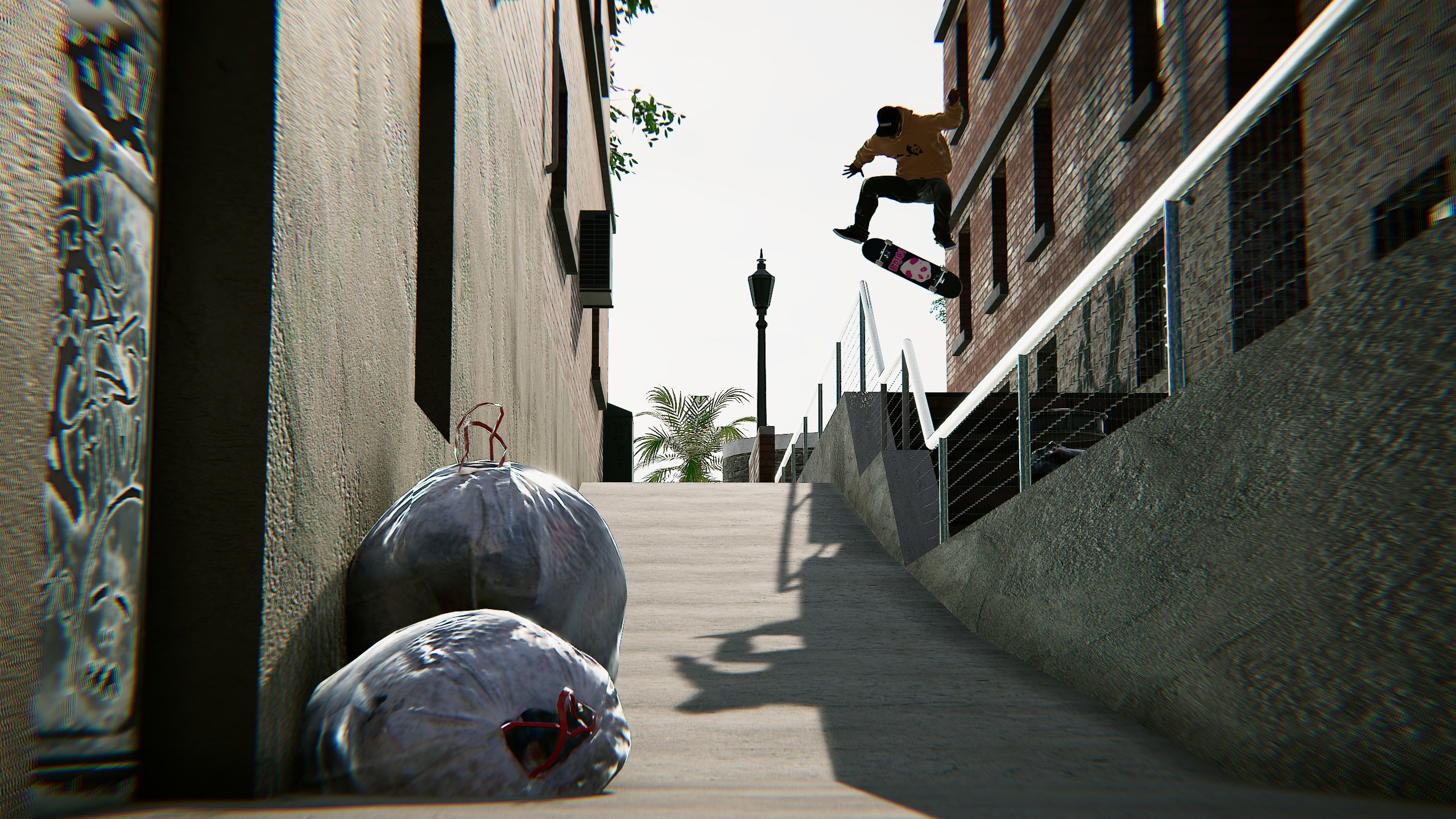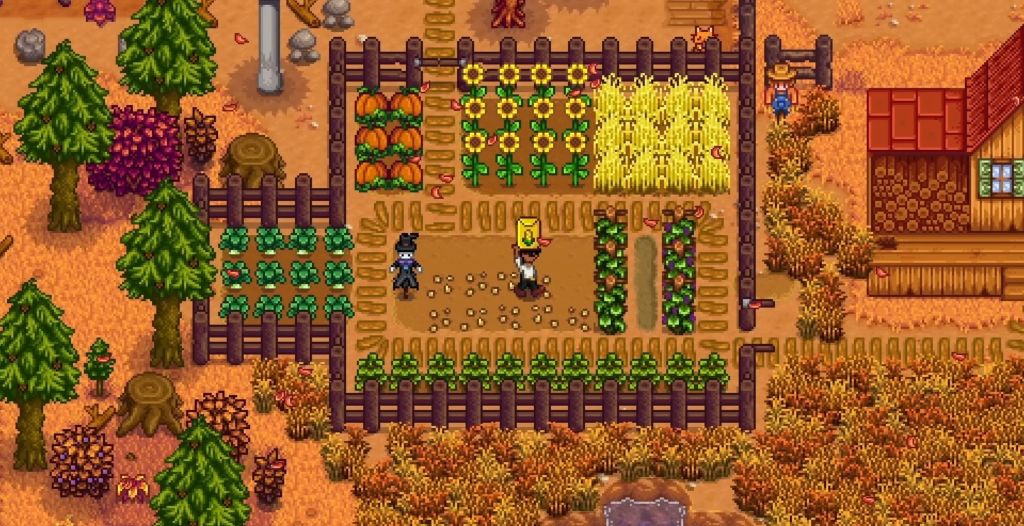Skater XL bills itself as “a head-first dive into the skateboarding world, where style, creativity and the perfect trick is yours to define.” Borrowing heavily from the Skate franchise, the game gives you big, open levels and a series of simple controls through which to navigate those spaces. You have a button to push. You have a thumbstick that controls your left foot and a stick that controls your right. The shoulder buttons let you grab your board and rotate. That’s the game. Have fun.
It is tempting to call Skater XL a “stripped down” game because those modes of control are, truly, the main course of the game. There is no story mode, nor is there any kind of direction of what you’re supposed to be doing other than a series of “challenges” that mostly teach you to do tricks. This is a bare-bones experience, but that austerity is on purpose. It is a platform upon which you can build your own skateboarding experience. The joy of the game is figuring out what kind of lines you can do, and then practicing and executing them. In stark contrast to the ever-more-wildness of the Tony Hawk’s Pro Skater games or the light-careerism of Skate, Skater XL doesn’t give you anything so you never forget why you’re there: skating.
Videos by VICE
To its credit, this is exactly how skateboarding is in real life. It’s like any other activity or art. You practice over and over until you can execute particular tricks in specific places. You find a set of stairs and you make sure you can ollie, or jump, down them. Then you practice kickflipping down them. Then you practice spinning 180 degrees while you kickflip. This is a building process that requires a single-minded focus that we associate with elite athletes or fine artists. And, remember, failing this maneuver that I am describing means that you are falling down five stairs. Success comes from repetition, and repetition is delivered through failure. In skateboarding, failure can hurt a lot.

Skater XL delivers that experience of setting up, practicing, and then succeeding at something that you have determined to do because it is important to you. Real-world skateboarding is almost entirely driven by personal desire (I need to do this) and peer pressure (everyone will think it is so cool if I do this). Collecting the letters scattered across the map in THPS or getting sweet pictures in Skate gets in the way of that pure self-determination, and so Skater XL removes those distractions.
Instead of the hijinks and weird filler of other skateboarding games, you get an austere universe of skate spots that you perform tricks on. And by stringing together these tricks you craft lines. Think of a trick as a word and a line like a sentence. You do a grind, land it, skate for a few feet, ollie a curb, do a wallride, skate for a few feet, and then do a flip trick down three stairs. This whole sequence is a line, and skate videos are largely made out of them. Skateboarders are evaluated by their ability to land tricks and string those tricks along into creative lines. There is an entire economy, from street skating to Olympic competition, that is based on these fundamental building blocks. Skater XL has fully absorbed the logic of the trick and the line as being skateboarding, and that’s what it gives the player. You get maps that can cohere together in whatever lines you want, and you can use the playback editor to create shareable clips of those experiences. It’s a simulation of a stance toward skateboarding, and it executes this vision perfectly.
This is skateboarding culture right now. It is about getting footage, saving some of it for video parts (the sections dedicated to individual skaters in skate videos) and then releasing the rest of it on social media. It is about capturing little sections of the holistic experience of skateboarding and then making those little parts seem really, really important. I described Skater XL as “stripped down” and “austere” above, and it’s not just because of the lack of game mechanics other than skating. It feels limited because its entire vision of skateboarding seems warped around the idea of capturing shareable video clips, as if all of skateboarding culture were the snippets we get on social media. It seems wholly dedicated on capturing what our current period sees as “good” skate footage and making sure other people see it.

In some ways, then, Skater XL is completely in sync with dominant skate culture. But anyone who skateboards regularly as part of their life would tell you that these snipped tricks or Instagram-length lines are not the entirety of skateboarding. There is a tension at the heart of Skater XL about what skateboarding is and could be. It presents a little part of the culture as the whole thing, and it feels like it’s lacking something because of that.
Sure, the game offers a small roster of pro skater skins you can put on, and there are branded items and familiar soundtrack songs. But anyone who pays even a little attention to skateboarding knows that it is an always-evolving art form with a magnificently fickle and weird set of fans whose favor shifts and moves constantly. What is cool in one moment will be gone the next, and the kinds of tricks that are in vogue today will be ignored tomorrow. Skateboarding video games have always been on the receiving end of that culture, largely happening in the wake of whatever big changes go on at the intersection between skateboarding and pop culture at large. The original Tony Hawk’s Pro Skater existed in the wake of the creation of the X Games and the professionalization of so-called extreme sports. Similarly, Bam Margerafication of pop culture precipitated shopping cart challenges in THPS 4 and the eventual takeover of the franchise by Margera’s CKY crew.
Skate came into play as kind of recovery of skateboarding after that moment, removing the antics and MTVish prankery and replacing it with the cool aesthetics of a Thrasher magazine ad. Mechanically, it focused on something closer to simulation of real tricks, and it told a common story of enthusiast to sponsored professional. It’s no surprise that Skate released in the same year that Nike’s skateboarding division released its first video, signaling an industrial shift in the skateboarding world that framed it as a growing sport with big-name sponsorship opportunities from brands beyond the skateboarding world.

I say all of that to note that these skateboarding games are reflections of the world of skateboarding and the culture around it, and Skater XL works the same way. It has a perspective on skateboarding that seems wholly consistent with the rules of the famous yearly Battle at the Berrics events at the famous L.A. skatepark. Skater XL always wants you to ollie into a trick. It has a robust set of ways to accomplish flip tricks with a relatively more limited moveset for grabs. It does not allow you to do many standby tricks in the history of skateboarding like no complys, bonelesses, or slappies. If you want to do things that are not flip tricks in your skateboarding game, you’re out of luck here, and there’s no way to get off your board to chain tricks together in weird ways (there is a healthy mod community already on the PC platform, but I don’t think it is entirely fair to point to fan-created mods when talking about what a game offers).
And that’s disappointing, because the embodied nature of skateboarding is what makes it so creative and weird. Skater XL seems almost singularly focused on mechanics that are recognizable to a competitive, corporate skateboarding. While it boasts interesting maps and with many interesting recreations of real-world spots, it fundamentally forces the player to interact with the world as if it were a skate park with very particular rules of engagement. I’m not shocked by this. Some of the first footage I saw of this game was back in 2018 when the podcast The Nine Club reviewed a video where the YouTuber Nightspeed recreated famous video parts from host Chris Roberts. Roberts, who has competed in and hosted the Battle at the Berrics, mostly discussed the capability of the game and how close Nightspeed was able to replicate his tricks. What these skateboarders were interested in wasn’t creativity or what the game allowed people to do in a robust way. Instead, they focused on the game’s capability to recreate something they were familiar with.
I get it. That makes for good podcast content. But it also reveals something about Skater XL. It wants you to create lines out of tricks, but the tools you can work from are the ones that the skateboarding of the late 2010s thought were valuable. It wants you to embrace a big sandbox, but that sandbox can only be approached in a limited set of ways. It wants to avoid telling you what to do, but the limited set of interactions and lack of weirder, but commonly used, tricks implicitly instructs you on how to use this tool.

Despite all of this, Skater XL is a great thing to play with. As critical as I am of it, I like setting up a line and trying it again and again until I get it right. It captures that part of the spirit of skateboarding, the perseverance and the repetition, that so many people find valuable. But in focusing on one value in our current skateboarding culture, it misses out on the art of the activity. It makes me think about a quotation from skater Ali Boulala: “It’s something fun to do. It’s like playing guitar or PlayStation or whatever you want to fuckin’ play. You can say that it’s an art form, and in some ways it is. Like to some people it’s a fuckin’ sport and it’s a job and it’s whatever. It’s as important as you make it, just the same as with everything else.”
Skater XL comes at skateboarding from the angle that it’s extremely important. It’s serious, and in cutting out the extraneous pieces and paring the mechanics down to the most basic elements of real skateboarding, they try to get the player to take it as seriously as they can. But in my heart of hearts, I think that a good skateboarding game should feel like skateboarding culture. It should be a little destructive. It should be goofy, and the things that seem so important to the culture should look absolutely goofy in 10 years. It’s as important as you make it, as Boulala says, and my ideal skateboarding game treats it as slightly less important. By treating it with less importance, we might get a bigger world of possible tricks and ways of playing with a skateboard. That game would be closer to what I love about skateboarding.
More
From VICE
-

Screenshot: ConcernedApe -

Screenshot: Midway -

Screenshot: Sony Interactive Entertainment -

Screenshot: Sony Computer Entertainment
